Select Gifford Lectures Delivered at Edinburgh (19 vols.)
Digital Logos Edition
This product has been transferred from Community Pricing to Pre-Pub. The actual funding level may be lower than it appears, which could delay production. The amount of funding still needed will be evaluated and updated soon.
Overview
Scottish judge Adam Gifford believed that the active knowledge of God engenders humanity’s well-being. Thus, in his 1885 will, he bequeathed funds to four Scottish universities—Edinburgh, Aberdeen, Glasgow, and St. Andrews—for the establishment of a lecture series dealing with the topic of natural theology. For over a century, the Gifford Lecture Series has featured the most prestigious theologians, ethicists, philosophers, and scientists, presenting premier research and insightful perspectives on the value of natural theology. Philosopher Jacques Barzun described the Gifford Lectures as “the highest honor in a philosopher’s career.”
This collection contains a selection of 19 lectures from the University of Edinburgh’s Gifford Series. The lecturers meditate on topics including the purpose of human existence, the design of the universe, the nature of nature, immortality, and the study of religion. Anyone interested in theology, philosophy, or science will find this collection a valuable addition to their digital library.
In the Logos editions, these volumes are enhanced by amazing functionality. Scripture citations link directly to English translations, and important terms link to dictionaries, encyclopedias, and a wealth of other resources in your digital library. Powerful searches help you find exactly what you’re looking for. Tablet and mobile apps let you take the discussion with you. With Logos Bible Software, the most efficient and comprehensive research tools are in one place, so you get the most out of your study.
Interested in reading more works from the Gifford Lectures series? Check out the 13-volume Select Gifford Lectures Delivered at Aberdeen.
- Lectures by prestigious scholars about natural theology
- Discussions of human existence, intelligent design, revelation, and immortality
- Historical perspectives on important debates in theology, philosophy, and ethics
- Title: Select Gifford Lectures Delivered at Edinburgh
- Series: Gifford Lectures
- Volumes: 19
- Pages: 6,566
- Philosophy and Theology by James Hutchison Stirling
- Natural Theology, vol. 1 by George Gabriel Stokes
- Natural Theology, vol. 2 by George Gabriel Stokes
- Philosophy and Development of Religion, vol. 1 by Otto Pfleiderer
- Philosophy and Development of Religion, vol. 2 by Otto Pfleiderer
- Philosophy of Theism by Alexander Campbell Fraser
- Elements of the Science of Religion, vol. 1 by Cornelius Petrus Tiele
- Elements of the Science of Religion, vol. 2 by Cornelius Petrus Tiele
- The Knowledge of God and Its Historical Development, vol. 1 by Henry Melvill Gwatkin
- The Knowledge of God and Its Historical Development, vol. 2 by Henry Melvill Gwatkin
- Synthetica: Being Meditations Epistemological and Ontological, vol. 1 by Simon Somerville Laurie
- Synthetica: Being Meditations Epistemological and Ontological, vol. 2 by Simon Somerville Laurie
- The Religious Experience of the Roman People by William Warde Fowler
- The Principle of Individuality and Value by Bernard Bosanquet
- The Value and Destiny of the Individual by Bernard Bosanquet
- Asianic Elements in Greek Civilisation by William Mitchell Ramsay
- A Faith that Enquires by Henry Jones
- The Idea of Immortality by Andrew Seth Pringle-Pattison
- Studies in the Philosophy of Religion by Andrew Seth Pringle-Pattison
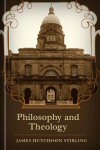
This volume contains James Hutchison Stirling’s lectures on philosophy and theology. Stirling argues that we perceive order and harmony in the empirical world; thus, underlying this order, there must be a designing mind. Stirling traces this “argument from Design” from Anaxagoras to Charles Darwin. He criticizes philosopher David Hume and naturalist Charles Darwin for what he perceived as their failure to recognize the causal role “design” plays in nature and speciation.
James Hutchison Stirling (1820–1909) was a medical doctor and philosopher. His publications include The Secret of Hegel, Darwinianism: Workmen and Work, and What Is Thought? Or, The Problem of Philosophy by Way of a General Conclusion So Far.
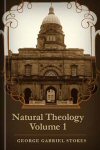
This volume contains part 1 of George Gabriel Stokes’ lectures on natural theology. The lectures focus on divine design, which Stokes defines as God’s will and creation itself. Stokes argues that a materialistic conception of the universe can only describe the inorganic phenomena caused by natural laws. To answer the “why” of all inorganic phenomena requires appealing to the supernatural.
George Gabriel Stokes (1819–1903) was the Lucasian Professor of Mathematics at Cambridge. His publications include the five-volume Mathematical and Physical Papers, On Light: Delivered at Aberdeen University: Burnett Lectures, and Röntgen Rays: Memoirs by Röntgen.
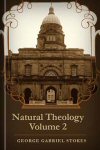
Natural Theology, vol. 2
- Author: George Gabriel Stokes
- Series: Gifford Lectures
- Publisher: Adam and Charles Black
- Publication Date: 1893
- Pages: 287
This volume contains part 2 of George Gabriel Stokes’ lectures on natural theology. The lectures focus on divine design, which Stokes defines as God’s will and creation itself. Stokes argues that a materialistic conception of the universe can only describe the inorganic phenomena caused by natural laws. To answer the “why” of all inorganic phenomena requires appealing to the supernatural.
George Gabriel Stokes (1819–1903) was the Lucasian Professor of Mathematics at Cambridge. His publications include the five-volume Mathematical and Physical Papers, On Light: Delivered at Aberdeen University: Burnett Lectures, and Röntgen Rays: Memoirs by Röntgen.
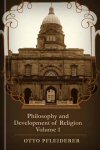
Philosophy and Development of Religion, vol. 1
- Author: Otto Pfleiderer
- Series: Gifford Lectures
- Publisher: G. P. Putnam’s Sons
- Publication Date: 1894
- Pages: 331
This volume contains part one of Otto Pfleiderer’s lectures on philosophy and the development of religion. Pfleiderer focuses on the relationship between religion and morality in its historical and philosophical context. He interprets history and nature as being teleological, purposefully moving toward an ideal state, arguing that this is indicative of God’s ultimate purpose.
Otto Pfleiderer (1839–1908) was professor of theology at the University of Berlin. His publications include Paulinism: A Contribution to the History of Primitive Christian Theology, The Early Christian Conception of Christ, and the German-language Religion and Religionen, published in English as Religion and Historic Faiths.
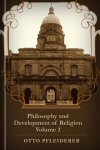
Philosophy and Development of Religion, vol. 2
- Author: Otto Pfleiderer
- Series: Gifford Lectures
- Publisher: G. P. Putnam’s Sons
- Publication Date: 1894
- Pages: 356
This volume contains part two of Otto Pfleiderer’s lectures on philosophy and the development of religion. In part two, Pfleiderer traces the views of revelation, the revealing of truth through communication with a supernatural entity, from the Old Testament through the Reformation. Pfleiderer argues that the purpose of revelation and the gospel is the transformation of society—bringing about an ideal humanity.
Otto Pfleiderer (1839–1908) was professor of theology at the University of Berlin. His publications include Paulinism: A Contribution to the History of Primitive Christian Theology, The Early Christian Conception of Christ, and the German-language Religion and Religionen, published in English as Religion and Historic Faiths.
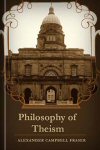
Philosophy of Theism
- Author: Alexander Campbell Fraser
- Edition: 2nd
- Series: Gifford Lectures
- Publisher: William Blackwood and Sons
- Publication Date: 1899
- Pages: 399
This volume contains Alexander Campbell Fraser’s lectures on the philosophy of theism. Fraser focuses on the question of human existence—why are we here? What is the purpose of the universe? Fraser argues that the existence of humanity and the universe itself is only intelligible if it is assumed that an infinite mind is behind it all.
Alexander Campbell Fraser (1819–1914) was professor of logic and metaphysics at the University of Edinburgh. His publications include Rational Philosophy in History and in System: An Introduction to a Logical and Metaphysical Course, Berkeley, Locke, and Thomas Reid.
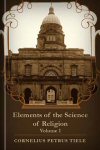
Elements of the Science of Religion, vol. 1
- Author: Cornelius Petrus Tiele
- Series: Gifford Lectures
- Publisher: William Blackwood and Sons
- Publication Date: 1897
- Pages: 322
This volume contains part one of Cornelius Petrus Tiele’s lectures on the science of religion. Tiele provides a definition for religion, viewing it as humanity’s internalized beliefs in the “superhuman” that motivate a response. Tiele also traces constant changes experienced in the evolution of all religions and, arguing that religion is a scientific discipline, establishes a philosophical framework for the study of religion.
Cornelius Petrus Tiele (1830–1902) was professor of the history and philosophy of religion at the University of Leiden. His publications include The Religion of Zarathustra, Comparative History of the Egyptian and Mesopotamian (Hamitic and Semitic) Religions, and History of Religion in Ancient Times.
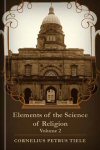
Elements of the Science of Religion, vol. 2
- Author: Cornelius Petrus Tiele
- Series: Gifford Lectures
- Publisher: William Blackwood and Sons
- Publication Date: 1899
- Pages: 305
This volume contains part two of Cornelius Petrus Tiele’s lectures on the science of religion. Tiele focuses on the elements present in all religions. He argues that all religious practices stem from an inherent human belief in the infinite, and that the purpose of this belief is to reconcile one’s self with one’s present situation. Tiele also argues that religious practices motivate humanity to strive for union with the divine.
Cornelius Petrus Tiele (1830–1902) was professor of the history and philosophy of religion at the University of Leiden. His publications include The Religion of Zarathustra, Comparative History of the Egyptian and Mesopotamian (Hamitic and Semitic) Religions, and History of Religion in Ancient Times.
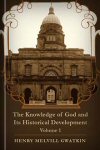
The Knowledge of God and Its Historical Development, vol. 1
- Author: Henry Melvill Gwatkin
- Edition: 2nd
- Series: Gifford Lectures
- Publisher: T&T Clark
- Publication Date: 1908
- Pages:304
This volume contains part one of Henry Melvill Gwatkin’s lectures on the historical development of the knowledge of God. Gwatkin addresses arguments for the existence of God, especially those based upon the perceived order and harmony of the natural world. Gwatkin also discusses the historical expression of God’s revelation, and humankind’s attempt to interpret it. The final portion of this volume comprises three lectures from part two of Gwatkin’s lectures. In this portion, Gwatkin discusses the development of primitive religions, the practices of polytheism and anthropomorphism, and Greek philosophy’s impact on Western religious thinking.
Henry Melvill Gwatkin (1844–1916) was Dixie Professor of Ecclesiastical History at Cambridge. His publications include Studies of Arianism and Early Church History.
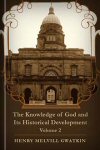
The Knowledge of God and Its Historical Development, vol. 2
- Author: Henry Melvill Gwatkin
- Edition: 2nd
- Series: Gifford Lectures
- Publisher: T&T Clark
- Publication Date: 1908
- Pages: 352
This volume contains part two of Henry Melvill Gwatkin’s lectures on the historical development of the knowledge of God. Gwatkin presents a history of Christianity, focusing on the Jewish and Christian traditions of interpreting the nature of revelation. Gwatkin also discusses Islamic traditions.
Henry Melvill Gwatkin (1844–1916) was Dixie Professor of Ecclesiastical History at Cambridge. His publications include Studies of Arianism and Early Church History.
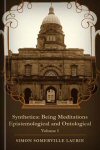
Synthetica: Being Meditations Epistemological and Ontological, vol. 1
- Author: Simon Somerville Laurie
- Series: Gifford Lectures
- Publisher: Longmans, Green, and Co.
- Publication Date: 1906
- Pages: 352
This volume contains part one of Simon Somerville Laurie’s Synthetica: Being Meditations Epistemological and Ontological. Laurie argues that the ultimate goal of human life is reunification with God. He states that God preordained all aspects of life, and that human existence is a constant struggle. Each obstacle is part of a progression towards a greater knowledge of God.
Simon Somerville Laurie (1829–1909) was professor of education at the University of Edinburgh. His publications include On the Fundamental Doctrine of Latin Syntax, Institutes of Education: Compromising an Introduction to Rational Psychology, and Historical Survey of Pre-Christian Education.
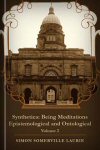
Synthetica: Being Meditations Epistemological and Ontological, vol. 2
- Author: Simon Somerville Laurie
- Series: Gifford Lectures
- Publisher: Longmans, Green, and Co.
- Publication Date: 1906
- Pages: 457
This volume contains part two of Simon Somerville Laurie’s Synthetica: Being Meditations Epistemological and Ontological. Laurie argues that the ultimate goal of human life is reunification with God. He states that God preordained all aspects of life, and that human existence is a constant struggle. Each obstacle is part of a progression towards a greater knowledge of God.
Simon Somerville Laurie (1829–1909) was professor of education at the University of Edinburgh. His publications include On the Fundamental Doctrine of Latin Syntax, Institutes of Education: Compromising an Introduction to Rational Psychology, and Historical Survey of Pre-Christian Education.
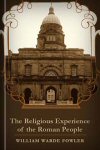
The Religious Experience of the Roman People
- Author: William Warde Fowler
- Series: Gifford Lectures
- Publisher: Macmillan and Co.
- Publication Date: 1911
- Pages: 504
This volume contains William Warde Fowler’s lectures on the religious experience of the Roman people. Fowler traces the historical transformation of Roman religion, surveying from the earliest times to the age of Augustus.
William Warde Fowler (1847–1921) was tutor and fellow of Lincoln College, Oxford. His publications include Julius Caesar and the Foundation of the Roman Imperial System, Social Life at Rome in the Age of Cicero, and Roman Essays and Interpretations.
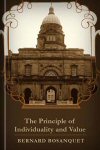
The Principle of Individuality and Value
- Author: Bernard Bosanquet
- Series: Gifford Lectures
- Publisher: Macmillan and Co.
- Publication Date: 1912
- Pages: 462
This volume contains part one of Bernard Bosanquet’s Gifford Lectures. Bosanquet expresses that human life is a finite expression of an infinite mind underlying all of reality. He also argues that religion cannot prove the existence of God, but that it can direct humanity toward the infinite.
Bernard Bosanquet (1848–1923) was professor of moral philosophy at University of St. Andrews. His publications include Logic, or the Morphology of Knowledge, The Civilization of Christendom and Other Studies, and The Meeting of Extremes in Contemporary Philosophy.
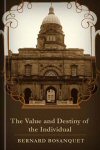
The Value and Destiny of the Individual
- Author: Bernard Bosanquet
- Series: Gifford Lectures
- Publisher: Macmillan and Co.
- Publication Date: 1913
- Pages: 331
This volume contains part two of Bernard Bosanquet’s Gifford Lectures. Bosanquet expresses that human life is a finite expression of an infinite mind underlying all of reality. He also argues that religion cannot prove the existence of God, but that it can direct humanity toward the infinite.
Bernard Bosanquet (1848–1923) was professor of moral philosophy at University of St. Andrews. His publications include Logic, or the Morphology of Knowledge, The Civilization of Christendom and Other Studies, and The Meeting of Extremes in Contemporary Philosophy.
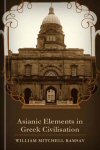
Asianic Elements in Greek Civilisation
- Author: William Mitchell Ramsay
- Series: Gifford Lectures
- Publisher: Yale University Press
- Publication Date: 1927
- Pages: 303
This volume contains William Mitchell Ramsay’s lectures on Asianic elements in Greek civilization. Ramsay focuses on the culture and history of Anatolia, present day Turkey.
William Mitchell Ramsay (1851–1939) was Regius Professor of Humanity at the University of Aberdeen.

A Faith that Enquires
- Author: Henry Jones
- Series: Gifford Lectures
- Publisher: Macmillan Co.
- Publication Date: 1922
- Pages: 278
This volume contains Henry Jones’ lectures on research and religious faith. Jones sought to awaken and foster the study of religious faith. Topics covered include free enquiry in religion, the nature of religion, the contrast of the finite and infinite, morality and religion, and the immortality of the soul.
Henry Jones (1852–1922) was professor of moral philosophy at the University of Glasgow. His publications include Browning as a Philosophical and Religious Teacher, A Critical Account of the Philosophy of Lotze: The Doctrine of Thought, and The Principles of Citizenship.
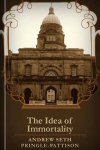
The Idea of Immortality
- Author: Andrew Seth Pringle-Pattison
- Series: Gifford Lectures
- Publisher: Clarendon Press
- Publication Date: 1922
- Pages: 230
This volume contains Andrew Seth Pringle-Pattison’s lectures on immortality. Pringle-Pattison provides a historical survey, focusing on each era’s expression of the idea of immortality.
Andrew Seth Pringle-Pattison (1856–1931) was professor of logic and metaphysics at the University of Edinburgh. His publications include The Development from Kant to Hegel, The Idea of God in the Light of Recent Philosophy, and Hegelianism and Personality.
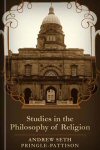
Studies in the Philosophy of Religion
- Author: Andrew Seth Pringle-Pattison
- Series: Gifford Lectures
- Publisher: Clarendon Press
- Publication Date: 1930
- Pages: 256
This volume contains Andrew Seth Pringle-Pattison’s lectures on the philosophy of religion. Pringle-Pattison discusses religion’s moral, social, and magical aspects. Next, he recounts the development of the religion of the people of Israel to Temple Judaism. He also provides a historical analysis of the development of Christianity.
Andrew Seth Pringle-Pattison (1856-1931) was professor of logic and metaphysics at the University of Edinburgh. His publications include The Development from Kant to Hegel, The Idea of God in the Light of Recent Philosophy, and Hegelianism and Personality.
Reviews
1 rating

Ian Carmichael
11/25/2013
The Giffords deserve a place in every thoughtful, studious Christian's library! (Yes there are some duds. Not many over the decades.)